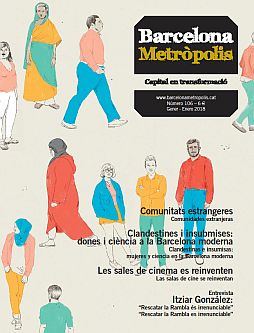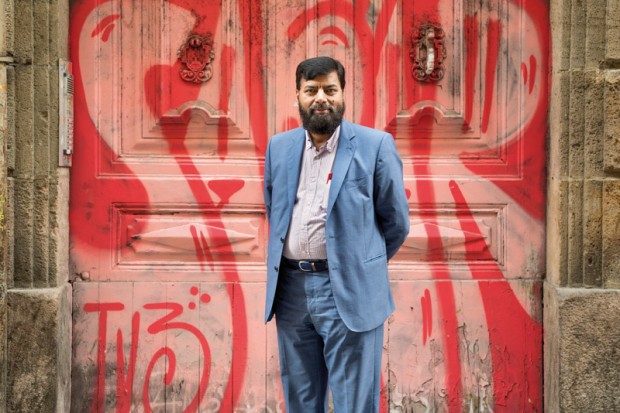
Muhammad Iqbal Chauhdry, owner of a travel agent’s and promoter of the mosque of the Centre Islàmic Camí de la Pau (Path of Peace Islamic Centre), is a religious and political example for the Pakistani community. He speaks excellent Catalan and can’t imagine living anywhere other than the Raval.
Photo: Dani Codina
Whether we’re buying food after hours, catching a taxi, getting a shawarma in the Old City or buying a drink from a street vendor, it’s very probable that we’re interacting with members of the Pakistani community. But what do we know about these discrete new Barcelonians?
The Pakistani community, with 19,285 members according to the latest municipal census, is the third most numerous immigrant group, behind the Chinese and the Italians. In the Ciutat Vella district they make up the largest immigrant community, and in the Raval neighbourhood, which receives plenty of immigration, they make up more than 20% of newcomers.
The Vice Consul of Pakistan in Barcelona, Umer Mela, confirms these figures, although he notes that they may be slightly below the real figures because there are always certain individuals who are not registered and are invisible in official statistics. He also explains that the majority come from the same region, Gujarat, a district of Punjab province in northern Pakistan, and that Barcelona attracts them because of “the environment of tolerance, the economic opportunities, the social services and being able to find compatriots from the same towns”, who end up forming one big collaborative family (baradari).
We also let Umer Mela describe the main general traits of Pakistanis in Barcelona. Even though stereotypes are always somewhat unfair and simplistic, they can help to paint a general picture. According to the vice consul, “they’re entrepreneurs, which means they’re not afraid to open businesses here as soon as they get over the cultural shock and the language barrier; they help one another out a great deal, they’re diligent and hardworking.
They do have a large number of businesses. They began selling roses in restaurants and butane, but now they run call shops, mobile phone stores, restaurants, barbershops, travel agencies… in some streets in El Raval, these establishments are one next to the other. They also have groceries, of course, which has even caused their demonym to become a part of common parlance: “I’m going to the paki to buy some X, we’re all out.” There are over a thousand of these businesses, which close late and open even on holidays, and they account for one-sixth of the city’s food sales.
The first Pakistanis reached Barcelona in the ‘70s, as an alternative destination to Great Britain and other central European countries that began to pass stricter immigration laws. A second phase took place from the end of the ‘80s to the mid-‘90s, when family reunifications began and the first women arrived (they still form a clear minority: 27%). The third phase began with the arrival of the new century, and it is marked by the extraordinary immigrant regularization processes that took place in 2001 and 2005. Pakistanis played a clear role in the protests, the hunger strike and lock-in at the Església del Pi in 2004.
Gaëlle Patin, the head of the Diversity and Interculturality program at Casa Àsia, isn’t a fan of stereotypes either. Still, she notes that they are a community that is open to their surroundings, where family and religion play a very important role, and that the Pakistani community is very involved culturally, socially, economically and even politically. They enjoy music and poetry as well as sports, especially hockey, cricket and kabbadi, a mix of freestyle wrestling and rugby. From Casa Àsia, Gaëlle promotes multiple intercultural projects to expand knowledge of a community she says is “still too little known”, to build bridges with their adoptive society and to promote their integration.
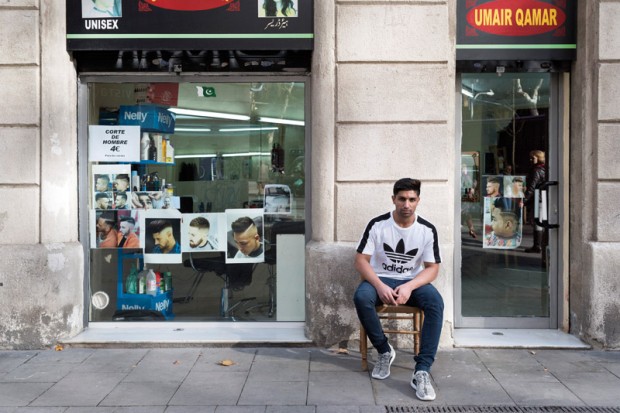
Umair works in his father’s barber’s shop in Carrer del Tigre, just off Ronda de Sant Antoni. A Muslim, he believes that all religions are good and that his is no better than the others.
Photo: Dani Codina
Pakistanis in El Raval: Umair, the barber
A boy with a headful of braids opens the door and steps in confidently. “I want this”, he says, showing a photo on his mobile phone. Umair looks at it for a few seconds and then says without hesitating “oh, like the Dominicans”. He starts out with the clippers, goes back over his work with scissors, and gives the finishing touches on the neck and around the ears with a razor. He works with the quick, precise movements of someone who does this many times a day. The customer pays him four euros and leaves, happy.
Umair’s barbershop is on Carrer del Tigre, near the Ronda de Sant Antoni. It belongs to his father, so it’s easy for him to organize his schedule the way he wants. Winning four euros at a time won’t make him rich, but it gives him enough to get by. When he isn’t cutting hair, he’s at home or out with his friends. He’s a Muslim, but he quickly adds that he has Christian friends, that all religions are valid and that his is no better than any of the others.
He remembers the day he arrived in Barcelona from Pakistan perfectly: June 21, 2009. He was twelve years old, and his father had come over some time before him. He wasn’t very interested in school, but he was starstruck by Messi, and overnight he replaced his passion for cricket with a passion for football. He was good with a ball, and he even ended up playing for Poble-sec and Espanyol. He tried to play for Barça, but they didn’t pick him.
Since his arrival in Barcelona he’s returned to the country of his birth seven times, but he’s sure that he couldn’t move back. He’s used to life in El Raval, and he considers himself a “Pakistani from here”. He says that there’s less racism in Barcelona and that people here are different from the other parts of Spain he’s seen.
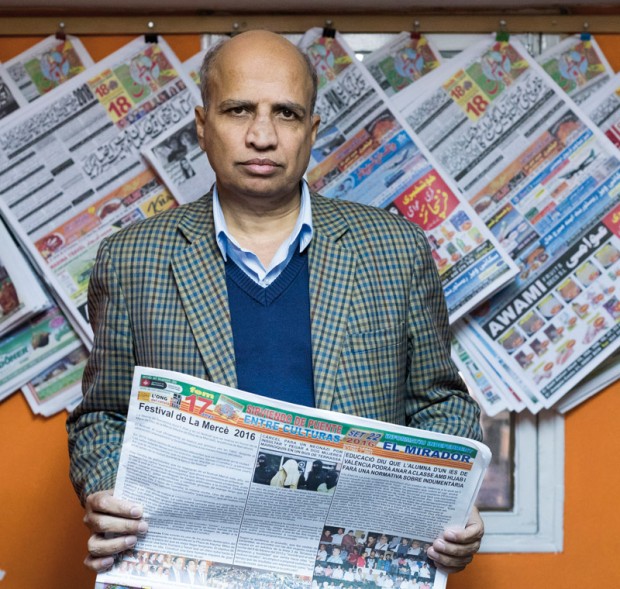
Journalist Javed Mughal is the founder of the fortnightly publication El Mirador dels Immigrants. As well as editor of the paper, he runs a print and copy shop, translates and teaches Urdu at the Escola Oficial d’Idiomes (Official Language School).
Photo: Dani Codina
Javed Mughal, the Journalist
In Lahore, Javed Mughal worked at a newspaper called Musawat Daily that belonged to the Bhutto family. When Benazir Bhutto was removed from power in 1990 and Mughal saw some of his friends wind up in prison, he packed his bags. After a long journey, he ended up in pre-Olympic Barcelona, where a friend of his had a restaurant.
Since all he knew how to do was write, he went to ask for a job at La Vanguardia newspaper, which was still on Carrer de Pelai. He knew English but no Spanish, and of course they didn’t want him. Some friends encouraged him to set up a newspaper in Urdu, and he decided to listen to them. He asked the owner of the parking garage where he worked as a night watchman to exchange his TV for a computer, and from there he put out the first few editions of El Mirador dels Immigrants (The Immigrants’ Lookout).
In the beginning, it was tough. The printing press would often print his texts upside down, until he started to add photographs to orient them. Now, seventeen years later, Mughal has a printing press and a print shop in the Raval neighbourhood, he continues to put out his newspaper every two weeks, he translates and he gives Urdu classes at the Official Language School whenever there’s demand. He’s happy in Barcelona, “a city open to different cultures that’s active 24-7”
Muhammad Iqbal Chauhdry, the facilitator
Zeeshan Kebabish on Carrer del Marquès de Barberà is known as one of the best Pakistani restaurants in Barcelona. When Iqbal comes in everyone stops talking, and they all come over to say hello and shake hands with him. I’ve been told that he’s a point of reference in the Pakistani community, both religiously and politically, and right away I can see that he’s a born leader. Tall and strong, with a thick, black beard, he speaks excellent Catalan and makes himself heard.
He came to Barcelona in 1989, and he says that there’s no other city like this one in all the world, and that having a port makes it even more universal. Iqbal feels Catalan, and he can’t imagine living anywhere other than El Raval. He owns a travel agency and is one of the promoters of the Path of Peace Islamic Centre Mosque. It’s run by the Minhaj-ul-Quran organization, which is also in the neighbourhood. For him, Islam is a way of life, both physically and morally, something that defines his behaviour and his way of interacting with others.
One of the two mobile phones he’s left on the table won’t stop ringing, and it interrupts our conversation as he’s showing me images from the Catalonia Premier Cricket League final on the other phone. When I ask him what all the calls are about, he tells me they’re from compatriots asking for help or advice on a wide range of issues like work, where to hold a wedding party for 200 people, or what to do to repatriate a cadaver.
Iqbal is drawn to politics, but the politics that take place in the street, not in offices. He’s collaborated with the Socialist Party of Catalonia (PSC) for years. He follows the issue of Catalan independence with great interest, and he thinks that one day the PSC will have to break away from the Spanish Socialist Party and do its own thing. He also tells me that he knows plenty of people in the Republican Left of Catalonia (ERC): “I had a meal with Oriol Junqueras at that table”, and that the only Catalan class he has ever taken was with Anna Simó.
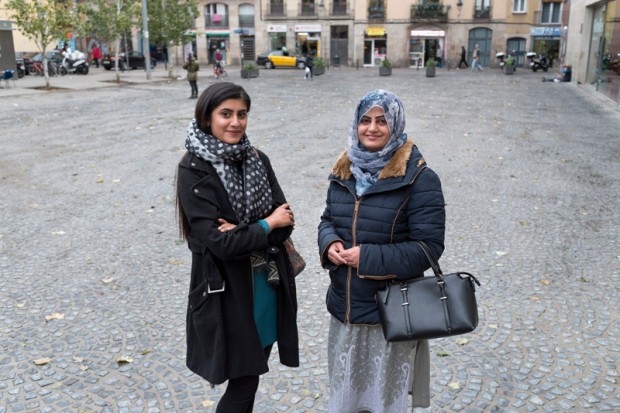
Komal Naz and Misbah ul Islam, two committed activists working for the well-being and promotion of women in their community, photographed in the Raval.
Photo: Dani Codina
Komal Naz and Misbah ul Islam, active and activists
I had a long conversation with Komal and Misbah in a spontaneous mix of Catalan and English at La Monroe, the bar of the Filmoteca de Catalunya. They met at the Pakistani literature classes taught by Misbah, and became fast friends. As a matter of fact, they could be sisters: they share a special union. They both know that they don’t want to wind up stuck at home; they want to participate actively in their surroundings.
Komal is extremely energetic, and she explains part of her own story in another article in this magazine. She’s been living in Montcada since she arrived at twelve years old. She studied humanities at the Autonomous University of Barcelona, and she’s started a whole series of initiatives with the common goal of helping others, especially helping other Pakistani women be more autonomous. Now she works as a mediator at a school in Sants, she works part-time with a community health program at the Tot Raval Foundation, and she collaborates with Casa Àsia’s “Aprenem, famílies en xarxa” (Let’s learn, families in a network) program.
Misbah arrived in Barcelona just three years ago following her husband, who’s a taxi driver just like Komal’s father. In Islamabad she was a professor at an important school for the Pakistani Navy, but she’s happier with the climate of Barcelona and the life she has here. Here, she gives Urdu classes to the children at the Collaso i Gil school in El Raval, among other things.
Both of them know that language is one of the biggest barriers faced by Pakistani women when they arrive. This makes them even more dependent on their husbands. The temptation to stay at home, taking care of the house and the kids is significant, especially in a culture that traditionally puts men in charge of supporting the family. Now, however, Komal is surprised and pleased to see that there are Pakistani girls who are starting to come over to pursue university studies all alone, without being married.



